#incubation program
Explore tagged Tumblr posts
Text
The Power Of Mentorship In Aqcellor’s World!
There are many ways of learning about business, industry, and entrepreneurship but none can be as effective as learning through mentorship.
When you interact with a mentor you draw on his or her real-life experience, including the failures and disappointments encountered along the way, all of which are as important as the final success achieved.
A mentor is a role model, someone we look up to as exemplary in the way they conduct themselves in business. The ideal mentor will inculcate the right values and morals, which again, cannot be sourced through textbook learning.

Aqcellor places great importance on the role of mentorship in its Entrepreneurship Program. A mentor can address a budding entrepreneur’s questions and concerns from a lived-experience perspective. A mentor is in a position to allay the fears and doubts of a young businessperson who is perhaps on the verge of giving up. The mentor has usually been there too.
Believe in Yourself
Seven years ago, serial entrepreneur, respected educator, innovator, and mentor Heminda Jayaweera told a student of his, “Don’t believe the speculations of others. Prove whether your idea is working or not and determine everything from your results.” Those words of advice led Dineth Egodage and his team to start Sprintylab, a failed venture, followed by Ceyentra Technologies, today a highly successful tech company.
Dineth met Heminda again after seven years, when Heminda was invited to speak on the topic ‘Innovation Mindset’ at Aqcellor in May. It was a proud moment when the student, now CEO, was able to tell his mentor that Ceyentra has multiplied its revenue 10x within five years. “We still we have a lot to learn from him,” says Dineth. “He is one of the best mentors, who changed our entrepreneurial journey.”
Mentorship is About Giving Back
Take Chartered Accountant Anandan (Arni) Arnold, Partner at BBK Partnership, who after 36-plus years in the UK remains passionate about giving back to Sri Lanka. One of the many youths who left the island in 1983, not just for his personal safety but for education, it was assumed he would take to medicine like his older brother, already a doctor in the UK.
Amusingly, he recalled how soon after his arrival in the UK, he asked his brother why he hadn’t returned home over the weekend. The doctor replied he had been working on shift. Arni cheekily replied, “Well then being a doctor won’t work for me, I have to play cricket!”
He ended up in the field of Accountancy and never for a moment forgot his Jaffna roots. Through the decades Arni has remained steadfastly connected to the motherland. In June this year he escorted a team of 20 second-generation British-Sri Lankan graduates in their first year of employment, together with some undergraduates on a tour of the east and north of the island. Amongst them they possess various skills including IT, cutting edge AI knowledge, medical, social sciences and more. Starting in the east in Batticaloa, then proceeding to Jaffna via Trinco, Vavuniya, and Kilinochchi, over the course of two weeks, the travelers have visited many orphanages, special needs children’s schools and hospitals.
They’ve offered sports, music, and educational gifts along the way. However, it’s safe to say that beyond the tangibles, it’s the memories of the motivational chats, the mentoring and the friendship shared with the children in orphanages that will remain in the hearts of both the givers and the receivers.
For Arni, whether it’s being out in the field, giving back to rural folk while providing an enriching experience to British youth who may otherwise never experience their ancestral homeland, or offering accountancy services and mentorship to other Sri Lankan startups, the genuine giving spirit he possesses places him among that exceptional breed of the diaspora Sri Lanka is fortunate to acknowledge globally.
Mentorship is a Beautiful Thing
The beauty of mentorship is that it is a ‘service’ that (usually) comes free of charge with no strings attached. The mentor is typically a senior person within their industry, often retired and always deeply committed to nurturing new talent, improving the prospects of underprivileged communities, and giving back in general for all the blessings that have come their way.
Mentors are not bound by social strata because they themselves have in many cases risen from poverty or difficult circumstances to conquer all obstacles in their way. They embody the term, ‘self-made’. A true mentor is a friend for life, someone who will always be in your corner cheering you on.
Author-Ajita Kadirgamar
#entrepreneurship#aqcellor entrepreneurship program#entrepreneur ideas#entrepreneur srilanka#entrepreneurship startup ideas#entrepreneurship program#incubation program#top women entrepreneurs#opportunities for women entrepreneurs#small business investors
0 notes
Text
like I genuinly don't think this will happen but like. I don't think I'd know what I'd do if vc's actually fund my dog food business. I'm like lowkey scared.
#would it be a dream come true. possibly. but would I know what to DO???#am I really the person to do it???#like the idea that I would have to drop out of uni and go into entrepreneurship full time is crazy to me#for context: I'm part of a startup incubation council and I pitched my business idea just as like. a silly lil haha#cause we were doing a program and I was like. yeah sure it'd just be an exercise to better understand building a business#but then we went through several rounds of pitching and mv and bmcing#and it's lowkey kinda viable???#and people are asking about it??#and it might be getting pitched to Venture capital?
12 notes
·
View notes
Text
Business Incubators and Training Programs for Women in Antigua and Barbuda
In Antigua and Barbuda, the landscape for women entrepreneurs is evolving, with various business incubators and training programs designed to provide essential support and resources. These initiatives aim to empower women, enhance their business skills, and facilitate the growth of their ventures. Below is a detailed overview of some prominent business incubators and training programs tailored…

View On WordPress
0 notes
Text
Exploring the Benefits of Business Incubators and Accelerators
For many entrepreneurs, transforming a brilliant idea into a successful business requires more than just hard work. Business incubators and accelerators are designed to provide startups with the essential resources, mentorship, and networking opportunities that can help them scale faster and more efficiently. But what exactly do these programs offer, and how can they benefit your business?1. What…
#advantages of accelerators#business development#business growth#business incubator#business incubator benefits#business incubators vs accelerators#business mentorship#entrepreneurship#entrepreneurship development#how incubators help startups#incubator applications#incubator vs accelerator#startup accelerator#startup accelerator programs#startup funding#startup support
0 notes
Text
Training: Orange Corners Incubation Program 2024
Orange Corners, Nigeria with partner organizations is accepting applications for a 6-month incubation program from young entrepreneurs in Ogun State with innovative sustainable solutions in the agricultural sector. The program will provide foundational entrepreneurial knowledge, tools, and resources to transform an idea into a business. The program will facilitate networks and support needed for…

View On WordPress
0 notes
Photo

A new accelerator is launched in Hyderabad, incubating startups in the cutting edge field of DeepTech. iTIC Incubator and H4XLabs have partnered to bring this program to India, with the aim of supporting entrepreneurs who are working on groundbreaking projects in this area.
#Accelerator Program#Defence#IDEX#IIT Hyderabad#iTIC Incubator#Technology#fault#DeepTech#Hyderabad#H4XLabs#Accelerator
0 notes
Text
Sales Strategies & Growth Frameworks For Startups
Innovate, Elevate, Accelerate : Join LTS accelerator and let's embark on a journey to reshape industries and redefine startup success! join webinar: https://t.ly/uG-5B
You tube: https://t.ly/WM6kL

0 notes
Text
Archipelago Labs unveils 5 startups in first ALAB Incubation Program Demo Day
Manila, Philippines — Archipelago Labs (A-Labs), a Philippines-based startup accelerator, featured five promising tech startups during the first demo day of its ALAB Incubation Program. The portfolio companies showcased their innovative products, solutions, and high growth potential to investors, mentors, media, and key ecosystem players. The five early-stage startups were selected from over 100…

View On WordPress
0 notes
Text
A Year at McGuffey’s Art Center: A Body of Work, Everyday Distractions and…Squirrel!
One of the distractions – a cuff bracelet made from the silk fabric Ben brought home from India. When Ben returned from India in January, he brought with him half a suitcase of stunning silk remnants, trimmings and buttons. At the time I thought I might use the fabric and findings to make drawstring bags embellished with embroidery and beading. But I overestimated my machine sewing skillset and…

View On WordPress
#Broadway Boogie Woogie#Fiber Arts Take Two#Harriet Goodall#Incubator Program#Karen Eide#Mark Kielkulki#McGuffey Art Center#Piet Mondrian
0 notes
Text
Rise of Startup Incubators in India - Its Framework and Policies
Culture, trade and economy have always blossomed in India and entrepreneurship has been built on these deep-rooted foundations. The rise in startup incubators has been the result of this ecosystem. Since the opening up of the Indian economy in the 90s, India’s startup economy has grown greatly due to favourable government response, adequate amount of funding, global investments, mergers & acquisitions and much more.
This story started in 1995 and it has seen a meteoric rise with the number of Startup Incubators in India currently reaching approximately 500.
What are startup incubators?
Startup incubators are organizations that provide support to startup companies by providing them with resources such as funding, mentorship and workspace. They are called incubators because they help foster the growth and development of early-stage businesses in the same way an egg incubator helps a chicken egg develop into a chick.
Types of incubators in India:
There are three main types of Startup incubators in India: business incubators, technology incubators, and social incubators - designed to help different types of businesses and entrepreneurs. Business incubators are designed to help start-ups and small businesses in the early stages of development, while technology incubators are designed to help companies develop and commercialize new technologies. Social incubators are designed to help social enterprises and non-profits achieve their goals.
Benefits of joining a startup incubator?
1. Access to Resources: The most important benefit of joining a startup incubator is the access to resources, such as mentors, funding, networks, and shared workspace. Incubators often provide workshops, seminars and other events that offer valuable advice and knowledge to startups.
2. Financial Support: Most startup incubators provide financial support to startups in the form of grants and investments. This helps startups get off the ground faster and with less risk.
3. Expert Advice: Incubators provide expert advice from experienced entrepreneurs and professionals. This advice can be invaluable in helping startups to develop their business plans and launch their products.
4. Collaboration: Incubators provide a platform for collaboration between startups, and can often be a source of valuable partnerships and joint ventures.
5. Networking: Joining a startup incubator provides an opportunity to network with like-minded entrepreneurs and investors. This can help startups to find partners, investors and customers.
The evolution of startup incubators in India:
The concept of startup incubators in India started gaining popularity in the early 2000s. These incubators provided a platform for entrepreneurs to develop their ideas, network with other entrepreneurs, and access the resources they needed to launch their businesses. Since then, the incubator ecosystem in India has grown significantly. Today, there are over approximately 500 incubators collaborating in every field such as technology, food & beverages, pharma, and Healthcare Startups in India. Additionally, some incubators also provide resources such as access to industry experts, technology, and networking events. The growth of the startup incubator ecosystem in India has been instrumental in catalyzing the growth of the startup sector in the country. Some of the best known incubators in India are Startup Village, GSF India Accelerator, Kyron Accelerator, and Mpowering Life sciences.
What type of policies have been applied by the government of India to encourage incubation policy?
1. Tax Incentives: The Indian government has implemented several tax incentives such as tax exemptions on profits earned from investments in startups and deductions on expenses incurred while setting up or running an incubator.
2. Finance: The government has set up multiple funds to provide financial support to startups. These include the Technology Development Board, the Startup India scheme and the Atal Innovation Mission.
3. Mentorship and Networking: The government has established multiple incubator networks including the National Science and Technology Entrepreneurship Development Board. These networks provide mentorship and networking opportunities to startups.
4. Regulatory Reforms: The government has undertaken several regulatory reforms to make it easier for startups to do business in India. These include eliminating the requirement for startups to obtain multiple licenses and relaxations of various labor laws.
Startup Village, GSF India Accelerator, Kyron Accelerator, and Mpowering Life sciences.
0 notes
Text

Riding The Waves Of Entrepreneurship: How To Navigate The Highs And Lows Of Your Journey!
There will be days when you keep your hand on your head and not have things figured out. These days can be frustrating, overwhelming, and draining, leaving us feeling stuck and helpless. These feelings aren’t unusual in your entrepreneurial journey.
During these times, it’s important to remember that it’s okay not to have all the answers. It’s only natural to have doubts, fears, and uncertainties, and it’s essential to acknowledge and accept these feelings rather than push them aside.
One way that helps me cope with hard days is to practice the pause and reflect on what’s causing any stress and confusion.
Sometimes, the problem lies in trying to do too much, or we’re not approaching the situation in the right way. Other times, it may be that we’re facing a challenge that we’re not equipped to handle alone.
In these situations, it’s helpful to reach out to others for support and guidance. Having someone to talk to can provide a fresh perspective and help us gain clarity and insight.
#entrepreneur srilanka#women entrepreneurs#incubation program#finance models#tech mentor#small business investors#business investors#opportunities for women entrepreneurs#female entrepreneur ideas#top women entrepreneurs#aqcellor entrepreneurship program#entrepreneur ideas#entrepreneurship program#entrepreneurship startup ideas#career opportunities#business opportunities
0 notes
Text
I truly don't know when this happened but at some point the entrepreneurship council I was forced to join became a community of people I genuinly enjoy hanging out with wtf.
1 note
·
View note
Text
We provide Faculty Development Program on Advanced Techniques in Molecular Biology & Genetics
#Faculty Development Program on Advanced Techniques in Molecular Biology & Genetics#Faculty Development Program#laboratory#greenarray#genomics company in india#pune#molecular diagnostic laboratory in pune#Faculty Development Program on Advanced Techniques in Molecular Biology#Faculty Development Program on Genetics#molecular biology training course in pune#incubation centre in pune#molecular diagnostic laboratory#covid-19 rtpcr testing#microarray system
0 notes
Text

Doctors in Rafah, the southernmost part of Gaza where over 1 million displaced Palestinians have fled, are raising alarm over the impact Israel’s expected military escalation will have on 25 preterm babies in incubators at Emirate Maternity Hospital. Glia, a medical aid group that currently has eight personnel at Emirate, said in a dispatch shared with Jezebel on Monday that no fuel has entered Gaza since May 6; the hospial has enough fuel for about 48 hours until its reserves run out. (On May 9, the United Nations said that no aid or fuel had been able to enter Gaza from Rafah since Israeli forces took control of the border crossing last week.) “If fuel does not enter immediately, the lights will turn off. Generators will stop running. Incubators will fail. Babies will die,” said Dr. Dorotea Gucciardo, a doctor with Glia currently stationed at Emirate. The 25 babies “are at immediate risk if these incubators are shut off.” Al Jazeera reported that, as of early Monday, Israeli forces ordered the medical staff at Kuwaiti Hospital, also in Rafah, to evacuate, as they continue to increase their attacks on the area. Last week, a UNICEF spokesperson said there is “nowhere safe on the Gaza strip to go to,” and that “Rafah is a city of children,” with 600,000 kids “caught in the crosshairs” of war. Since the start of Israel’s assault on Gaza in October, the United Nations estimates that over 14,500 children have been killed; more than 35,000 Palestinians of all ages have died due to Israeli bombs and gunfire. The full scale of casualties, including death from malnutrition and illness, is not yet known. Dr. Tarek Loubani, the head of Glia’s medical programs, and Gucciardo pleaded with the international community to care about the fate of the preterm babies being kept alive by incubators (and thus, fuel.) In a statement to Jezebel, Loubani referenced four incubated babies at al-Nasr Children’s Hospital who were found dead and decomposing (“eaten by worms [and] blackened by mold,” according to the Washington Post) in December, after Israel forced hospital staff to flee, assuring them the babies would be cared for. “The global community cannot allow this to happen again,” Gucciardo said.
#yemen#jerusalem#tel aviv#current events#palestine#free palestine#gaza#free gaza#news on gaza#palestine news#news update#war news#war on gaza#children of gaza#gaza genocide#genocide#rafah#all eyes on rafah#rafah under attack#Palestinian hospitals
447 notes
·
View notes
Note
Top five small birds go
PICKING ONLY 5 is CRUEL but I don't have time for 10. Species names will have the links to photo sources where applicable.
Long-tailed Manakin. They take like 4-5 years for the males to learn their dances and each year they look a little more like adults to match their experience! They are little and yet have very long tails!! And cute little caps! Very elegant tiny birds.
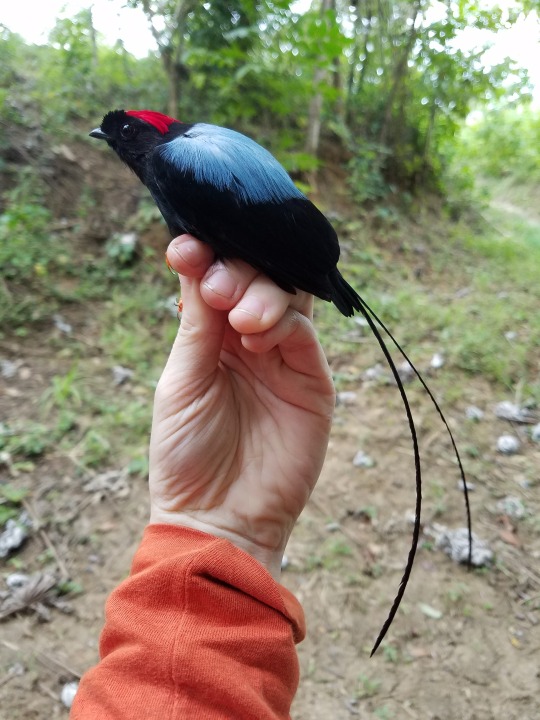
(Photo by me, bird handled and released on site with permits as part of MoSI, a long-running collaborative research program).
2. Wrentit. Look past the plain gray exterior, let me teach you some BIRD FACTS because these guys are basically aliens. They live in a very small part of the west coast of North America in scrub/chaparral, and we still don't really know how they got there or where their nearest relatives are or what birds they're even related to, though recently they think maybe it's parrotbills, which are otherwise mostly found in SE Asia.
During the breeding season, most female birds develop a brood patch, a section of bare skin on the belly for aiding in heat transfer to the eggs, and most male birds develop a swollen cloaca to facilitate sperm transfer. In some species where males help incubate, they also get brood patches. This is fine. Male Wrentits get brood patches. A little weird but not too crazy. Female Wrentits, however, get a swollen cloaca? Why?? Nothing else in North America does this? I don't.... understand.
Also they're cute, they have a song that's like a bouncy ball going down stairs, and males and females have slightly different songs, so even though we can't determine the sex in the hand like with normal birds, at least if they sing you can tell. Normal birds don't sing when being handled. Wrentits definitely sometimes do. I don't get it. But I love them for it.
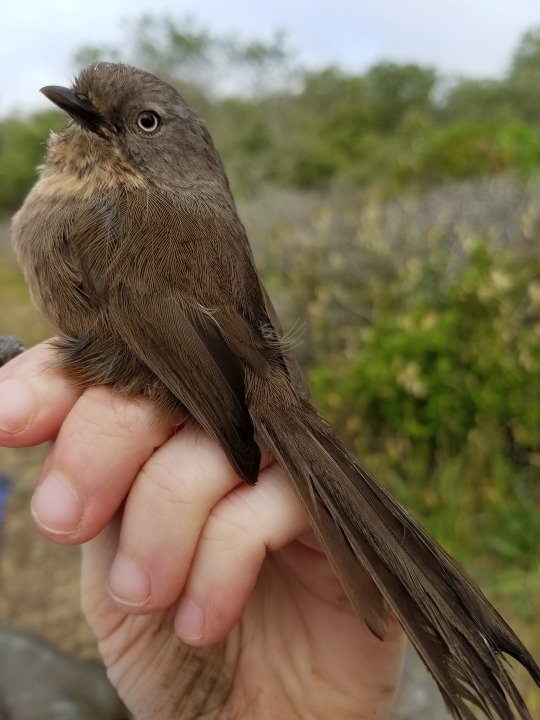
(Photo mine, bird banded and released on site with permits as part of MAPS, a long-term research program).
3. Calliope Hummingbird. Itty bitty tiny creature, would absolutely spear you to death with its face if it thought it could pull that off. Hummingbirds in general are territorial and aggressive and these guys are no exception. Also they're beautiful. Look at that starburst of a face!
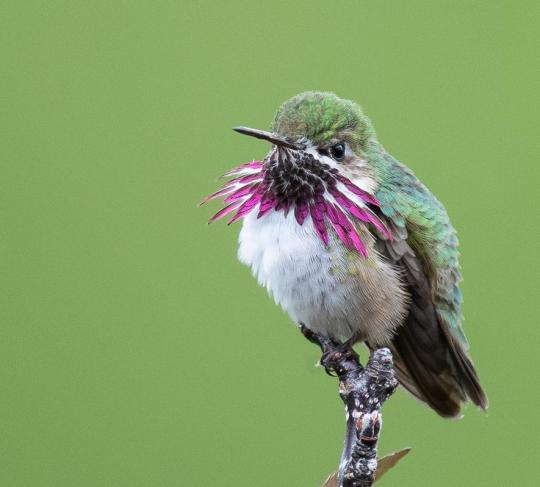
(I have photos but don't want to go dig them up, I'm lazy)
4. Java Sparrow. Help, I'm hopelessly charmed by how adorable they are. Unfortunately, apparently everyone else is too, and these are now critically endangered in their home range of Java due to habitat loss and poaching for the pet trade. The good?? news is they're also super invasive in places like Hawaii, so they're not about to go globally extinct, so that's cool, I guess.
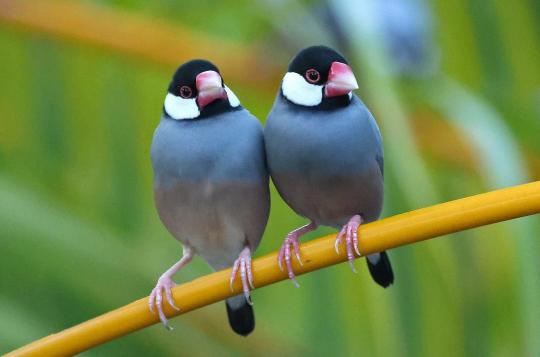
5. Micronesian Rufous Fantail, formerly just Rufous Fantail, aka chichirika na'abak because look I don't know proper indigenous names for everything but I do for my study birds and I support their use. Chichirika is CHamoru for "showoff" and na'abak is "the one who will lead you astray", after the local stories of kids trying to follow these delightful little low-flitting creatures through the jungles and getting hopelessly lost, leading to village search parties.
Anyway, look at that tail!! Go listen to their cute little squeaks! I'm absolutely in love. I've banded literal hundreds of these and they never ever get old. Every single one of them is a treasure to me.
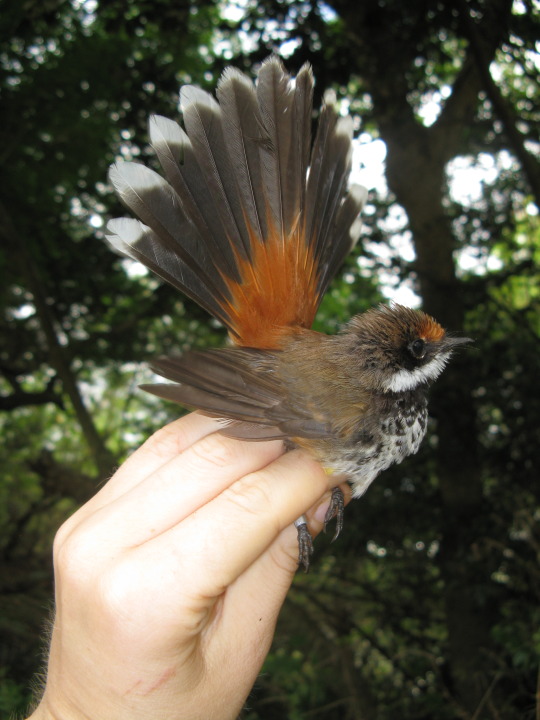
(Photo by me, bird banded and released on site as part of my very most beloved own tropical forest bird research program in the Northern Mariana Islands).
279 notes
·
View notes
Text
Earl, who would throw himself at walls to get away from me when he first arrived, eating watermelon at my feet. He's come a long way, and I'm glad for it.
Stella, the hen in with him, has started laying again. She's the only hen that didn't try to set a nest during the spring laying cycle. She's been in with Earl long enough that it's possible, if he's been eager, her eggs may be fertilized by him. I'm going to sling them into the incubator, just to see. If not, no harm done- I can still blow out the eggs and sell them to paint. If so, my European violet program may move forward early.
Fingers crossed!
224 notes
·
View notes